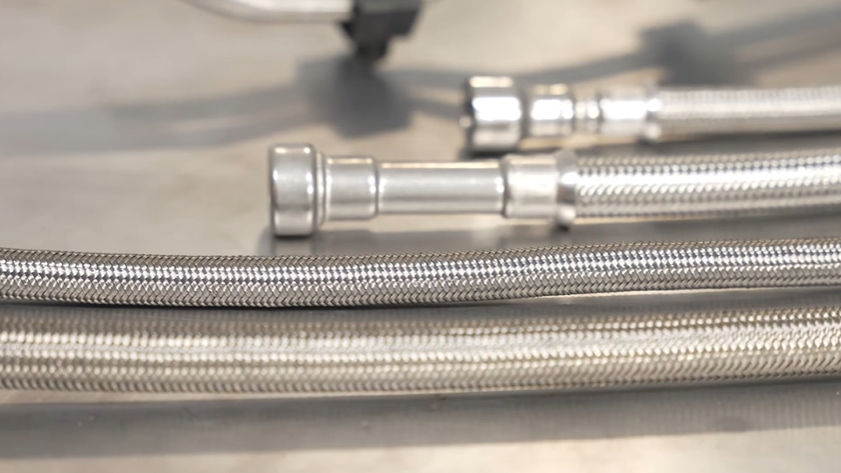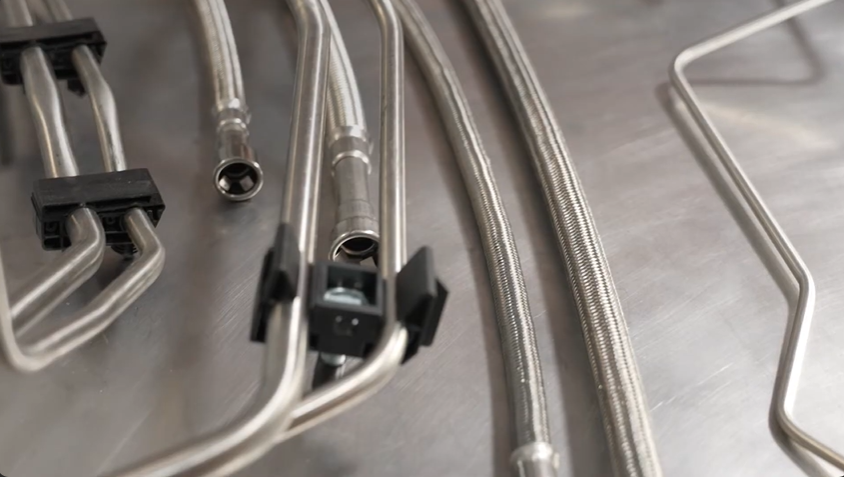Yes, the fuel line is oil-resistant. This is because the fuel line is made of a special type of material that is designed to be resistant to oil and other chemicals. Fuel line is typically made from a synthetic rubber or a composite material, which makes it much more durable than regular rubber.
Fuel line oil resistance is something that is often overlooked but is actually quite important. Most fuel lines are made from materials that are not naturally resistant to oil, so it is important to make sure that your fuel line is properly coated or treated in order to prevent any potential damage. There are a few different ways to do this, and the best method will vary depending on the type of fuel line you have.
However, in general, you can either use an oil-resistant coating or treatment, or you can replace your fuel line with an oil-resistant one. Whichever method you choose, just be sure to take the necessary precautions to keep your fuel system protected.
Is Rubber Fuel Hose Oil Resistant?
If you’ve ever worked with fuel lines, you know that they can be tricky. Fuel hoses are made of a special material that is designed to withstand the harsh chemicals found in gasoline and other fuels. However, this material is not always oil-resistant.
That’s why it’s important to know what kind of hose you need for your application. There are two main types of fuel hoses: rubber and braided steel. Rubber hoses are less expensive and easier to work with, but they’re not as durable as braided steel hoses.
Braided steel hoses are more expensive, but they’re much more resistant to wear and tear. When choosing a fuel hose, it’s important to consider the type of fuel you’ll be using. If you’re using regular unleaded gasoline, a rubber hose will probably suffice.
However, if you’re using ethanol-blended fuel or racing fuel, you’ll need a braided steel hose. Ethanol-blended fuels are especially hard on rubber hoses, so it’s best to avoid them if possible. No matter what type of fuel hose you choose, make sure it’s rated for the specific type of fuel you’ll be using.
Not all hoses are created equal!
What Type of Hose is Oil Resistant?
An oil-resistant hose is one that is able to withstand contact with oil. This can be either synthetic or natural oils. The hose must be able to resist degradation from the oil, as well as any swelling or hardening that could occur.
There are a variety of different types of hoses that claim to be oil-resistant, but not all hoses are created equal. When choosing an oil-resistant hose, it is important to select one that is made from a high-quality material such as nitrile rubber. This type of rubber is specifically designed to resist degradation from oils and will not swell or harden when in contact with them.
Will a Fuel Hose Work for Hydraulic Oil?
No, the fuel hose is not designed to work with hydraulic oil. Fuel hose is made to withstand exposure to gasoline, diesel, and other petroleum-based products. Hydraulic oil is a synthetic lubricant that is not compatible with these products.
If you use a fuel hose for your hydraulic system, it will break down and degrade the hose, potentially causing leaks or failure of the system.
What Can Damage Fuel Lines?
There are a few things that can damage fuel lines. The most common is exposure to the elements. Sunlight, rain, and snow can all cause the lines to deteriorate over time.
This is why it’s important to inspect them regularly and replace them when necessary.
Another thing that can damage fuel lines is corrosion. This can be caused by a number of things, including water contamination or even just old age.
It’s important to check for signs of corrosion regularly and replace any affected parts as soon as possible.
Finally, physical damage can also occur to fuel lines. This could be from something as simple as a loose hose clamp rubbing against the line, or from more severe impacts in an accident.
Again, it’s important to inspect the lines regularly for any signs of damage and replace them if necessary.
These are the only fuel lines you’ll ever need
What is the Best Material for Fuel Lines
There are a few factors to consider when deciding what material to use for your fuel lines. One important factor is compatibility with the fuel you are using. Another factor is durability and resistance to abrasion and corrosion.
Here are some of the most common materials used for fuel lines and their pros and cons: PVC: PVC is a popular choice for fuel lines because it is inexpensive and easy to work with. It is compatible with most fuels, including gasoline, ethanol, and methanol.
However, PVC is not as durable as some other materials and can be susceptible to abrasion and corrosion. Stainless steel: Stainless steel is a good choice for durability and resistance to abrasion and corrosion. It is compatible with most fuels, including gasoline, ethanol, methanol, and biodiesel.
However, stainless steel lines can be difficult to install due to their stiffness. Rubber: A Rubber hose is flexible, which makes it easy to install in tight spaces. It is also compatible with most fuels, including gasoline, ethanol, methanol, biodiesel, and aviation fuel.
However, a rubber hose is not as durable as some other materials and can be susceptible to abrasion and punctures.
Best Ethanol-Resistant Fuel Hose
If you are looking for the best ethanol-resistant fuel hose, then you have come to the right place. In this blog post, we will provide detailed information about the different types of fuel hoses available in the market and their features. We will also explain how to choose the right fuel hose for your vehicle.
Ethanol is a type of alcohol that is commonly used as a fuel additive. It is added to gasoline to increase its octane rating and improve engine performance. However, ethanol can also cause corrosion and degradation of rubber and plastic parts in a vehicle’s fuel system.
This can lead to serious problems such as leaks or even fires. To protect your vehicle from these potential problems, it is important to use a fuel hose that is resistant to ethanol. There are two main types of ethanol-resistant fuel hoses: those made with synthetic rubber and those made with fluoropolymer (PTFE).
Synthetic rubber hoses are more flexible than PTFE hoses and are less likely to kink or crack. They can also withstand higher temperatures than PTFE hoses without losing their shape. However, synthetic rubber hoses are not as chemically resistant as PTFE hoses and may degrade over time when exposed to ethanol-containing fuels.
PTFE hoses are more expensive than synthetic rubber hoses, but they offer superior chemical resistance and durability. They can withstand higher temperatures than synthetic rubber hoses without losing their shape or becoming brittle. PTFE hoses are also less likely to kink or crack than synthetic rubber hoses.
When choosing an ethanol-resistant fuel hose for your vehicle, it is important to select one that is compatible with the type of fuel you will be using (E85, 91 octane, etc.).
Diesel Fuel Lines And Fittings
Diesel fuel lines and fittings are an essential part of any diesel engine. The fuel lines carry the diesel fuel from the tank to the injectors, while the fittings provide a way to connect the various components of the system. There are many different types of diesel fuel lines and fittings available, so it is important to choose the right ones for your engine.
The most common type of diesel fuel line is made from steel. This material is strong and durable, but it can rust over time. If you live in an area with a lot of salt or other corrosive materials in the air, you may want to consider using stainless steel lines instead.

Another option is to use aluminum lines, which are lighter weight and will not rust, but they are more susceptible to damage from impact. When choosing fittings for your diesel engine, there are two main types: compression and flare. Compression fittings have a nut that tightens down on the line, while flare fittings have a flared end that fits into a matching socket.
Both types of fitting will work well with most engines, but compression fittings are generally easier to install and remove. Once you have chosen the right materials for your fuel lines and fittings, it is important to install them properly. If you are not familiar with working on engines, it is best to leave this task to a professional mechanic.
However, if you feel comfortable doing it yourself, be sure to follow all instructions carefully and take precautions such as wearing gloves and eye protection when working around gasoline or other flammable liquids.
Types of Fuel Lines
There are several types of fuel lines used in cars, trucks, and other vehicles. The most common type is the steel fuel line, which is made from a tough and durable metal. This type of fuel line is resistant to corrosion and can withstand high temperatures.
Another common type of fuel line is the rubber fuel line, which is made from a flexible material that can be routed around tight corners. This type of fuel line is less resistant to heat and may degrade over time if exposed to excessive heat or sunlight. Finally, there are braided metal fuel lines, which are made from a flexible metal that is woven into a braid.
These types of fuel lines are very strong and can resist high levels of pressure and vibration.
Conclusion
The blog post discusses whether the fuel line is oil-resistant. It notes that the fuel line is made of different materials, including rubber and nylon, which have different degrees of oil resistance. It concludes that while some fuel lines may be more resistant to oil than others, all fuel lines will eventually degrade when exposed to oil.




Leave a Reply